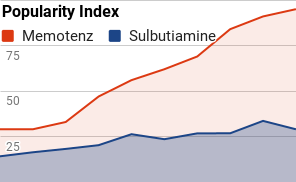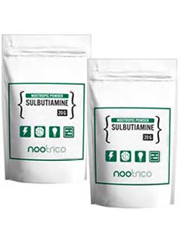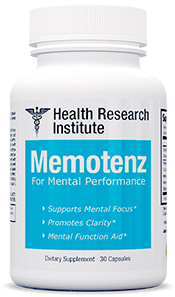Sulbutiamine Review: Don’t Buy Before You Read This!
User Rating:
29%
 +
-
+
-
What is it?
Sulbutiamine is a synthetic nootropic agent that is said to be effective for improving users’ memory and mental performance. It was originally developed as a vitamin replacement option, but some scientists believe that it may have other benefits to the body as well.
Sulbutiamine has been used to increase cerebral blood flow and may have applications for improving the symptoms of diabetes and nerve damage. It is sometimes said to be useful for improving energy level and power output, as well as potentially for maintain healthy blood sugar levels.
The nootropic supplement that has seen the most significant improvements in its users’ memory function and thinking abilities is called Memotenz. It is an all-natural blend of herbs and amino acids that increases neurological performance and health. Click here to learn more about Memotenz’s ingredients blend and manufacturing process.
Sulbutiamine Ingredients and Side Effects
Sulbutiamine: A man-made thiamine supplement that was designed to help fight thiamine deficiencies, but may also have some other benefits for the body. Though there is little clinical data to support these beliefs, researchers have claimed at various times that it can help with conditions such as:
Sulbutiamine was first synthesized in Japan in 1965 as part of a reaction to a national thiamine deficiency crisis. Thiamine, also known as vitamin B1, is a critical for a number of bodily processes, however it is not readily available in many of the staples of the traditional Japanese diet. This led to a nationwide epidemic of the disease beriberi, which attacks people with severe thiamine deficiencies.
As a result, scientists from the Taisho Pharmaceutical Company worked to develop a B1 substitute that was more efficient and bio-available than other supplemental forms of thiamine. They created an ester of two B1 molecules bonded with a sulfur group, which allowed the compound to bond more easily with fat cells in the body.
This made it possible for more of the thiamine to cross the blood-brain barrier, the membrane that protects the brain from harmful chemicals. Regular forms of thiamine can have difficulty passing through the semi-permeable wall of endothelial cells that make up the barrier, however Sulbutiamine has a much better chance of being absorbed.
There is a considerable amount of debate about the actual effects of Sulbutiamine. Many of the studies that have touted its beneficial effects have since been disproven and there is a general lack of study that has gone into understanding how effective it may or may not be, especially as a nootropic supplement.
Many of the manufacturers of Sulbutiamine supplements claim that it is effective for fighting fatigue, however that seems to only be true in very specific circumstances. Certain kinds of fatigue, such as fatigue related to symptoms of multiple sclerosis (MS), may see benefits from taking Sulbutiamine, whereas normal physical fatigue or fatigue due to infection or illness is not likely to be improved.
Thiamine is involved in the metabolization of sugars, amino acids, and alcohols, however Sulbutiamine has not tended to demonstrate effectiveness for improving these functions in healthy adults. Some manufacturers have claimed that Sulbutiamine may be effective for improving blood sugar levels and symptoms of diabetes, however these claims have been disproven clinically.
There are some studies that claim that thiamine and Sulbutiamine may help improve memory function in some people, however that may only be relevant to people with thiamine deficiencies. A baseline amount of thiamine is needed in order for normal mental function, however higher quantities of the vitamin are most likely not going to yield better results for memory performance.
Sulbutiamine is considered safe for human consumption and is well tolerated by the vast majority of users, at least in the short term. Some potential side effects that have been reported may include:
There are some concerns about Sulbutiamine being a drug of abuse for patients with certain psychiatric conditions, especially bi-polar disorder. People with bi-polar disorder should talk to their health care providers before beginning to take Sulbutiamine.
There are not enough studies into the long-term effects of Sulbutiamine to say definitively that it is safe when taken on a daily basis over a prolonged period of time. More data about Sulbutiamine, its safety, and its effects is needed before our team of experts is ready to recommend it for any specific uses – especially as a nootropic – at this time.
Click here to see our experts’ list of the top ten nootropic supplements available without a prescription.
Sulbutiamine Quality of Ingredients
 Sulbutiamine was developed to help people with thiamine deficiencies get access to an easily absorbed source of vitamin B1, and that remains its most useful function. Beyond the prevention of beriberi and other thiamine-deficiency related conditions, there is little definitive use for Sulbutiamine.
Sulbutiamine was developed to help people with thiamine deficiencies get access to an easily absorbed source of vitamin B1, and that remains its most useful function. Beyond the prevention of beriberi and other thiamine-deficiency related conditions, there is little definitive use for Sulbutiamine.
It is not recommended as a source of energy or to fight fatigue, except in cases of specifically MS-related tiredness. It should also not be taken with the expectation that it will be effective as a memory enhancement, an athletic performance booster, or for the management of the symptoms of diabetes.
It is unlikely that healthy users that do not suffer from psychiatric conditions will see any negative effects from taking Sulbutiamine. It is possible that it may be helpful long term as a neuroprotectant and circulatory aid, however there is no definitive proof of this. In general, more data is needed about Sulbutiamine and its effects, however there is no indication that it can be useful as a study, work, or creative performance enhancement aid.
Follow this link to find out which nootropics have tested the highest for improved memory function and attention span.
The Price and Quality of Sulbutiamine
Sulbutiamine is distributed by a number of different manufacturers, all with varying dosages and pricing structures. Here are several of the brands that are currently available online and their costs:
- Absorb Health: 1, 100-count bottle of 500 mg. Sulbutiamine capsules: $31.99
- Double Wood Supplements: 1, 50-count bottle of 200 mg. Sulbutiamine capsules: $32.95
- Nootropics City: 1, 90-count bottle of 200 mg. Sulbutiamine capsules: $19.66
- Bulksupplements: 1, 10-gram bag of Sulbutiamine powder: $13.96
- Wholesale Health Connection: 1, 10-gram bag of Sulbutiamine powder: $8.99
This is somewhat less expensive than some single ingredient supplements and is far less expensive than most effective nootropics brands. It is not likely to be effective on its own however, so most users will probably choose to seek out a secondary nootropic supplement, if that is a financially viable option for them.
To learn more about choosing the right nootropic for your specific goals and needs, click here.
Business of Sulbutiamine
The company that first developed Sulbutiamine is known as Taisho Pharmaceuticals, Inc. They have been in business over a century and are known for developing the drugs Lipovitan, Clarithromycin, amongst others. Their contact information is listed as:
Phone Number: +81-3-3985-1115
Address: 3-24-1, Takada
Toshima-ku, Tokyo
Email: Taisho Pharmaceuticals does not publish and email address publically.
Taisho is in good standing with the FDA and there is no evidence that they have any outstanding formal complaints or legal actions against them.
For data about how nootropic supplements have helped people improve their mental performance, follow this link.
Customer Opinions of Sulbutiamine
The most frequent responses from former customers about their experience with Sulbutiamine tend to be disappointment. Here are several reviews, taken directly from previous customers posts online:
“Um… when’s it supposed to kick in? I’ve taken nearly a whole bag of this powder and I have yet to notice one difference.”
“Did not react well with me. I took it like the directions said and I started getting crazy headaches and I couldn’t sleep. I started thinking very bad thoughts.”
“I think the only way that this garbage has made me smarter is by teaching me the valuable lesson that this stuff is garbage.”
Potential customers should also be aware that there were several reports of contaminated supplements reported online, particularly in relation to several brands of the powdered versions.
Click here to read more reviews about the best nootropic products on the market today.
Conclusion – Does Sulbutiamine Work?
At this point in time, Sulbutiamine has not been as well studied as most of the nootropics that our team recommends. There is very little in the way of actual scientific data that suggests that Sulbutiamine may be a viable ingredient for a mental performance supplement.
The main exception to this would be anyone with a diagnosed thiamine deficiency. For those individuals, Sulbutiamine may be one of the most effective options available. It is better absorbed than regular B1 vitamin products, and as such may be a more efficient option for supplementation.
The single most effective nootropic product on the market is Memotenz. They use a variety of different ingredients that stimulate key biological processes related to memory, cognition, and neuroprotection.
It’s been shown to increase blood flow to the brain, cell signaling and communication, and it strengthens the neural wiring itself. Click here to see all of the many benefits that Memotenz can offer for improved mental performance.
Featured Diets











LOL! Sounds like nobody realizes it’s fat soluble… So it MUST be taken with some fish oil or olive oil.